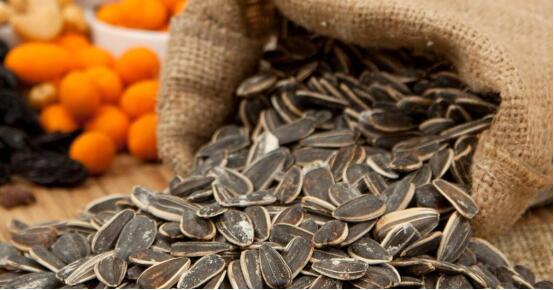1. Sunflower seeds contain about 50% fat, which is mainly unsaturated fats and contains no cholesterol; linoleic acid content can reach 70%, which helps reduce
blood cholesterol levels in the human body and is beneficial for protecting cardiovascular health. 2. Rich trace elements such as iron, zinc, potassium, and
magnesium make sunflower seeds prevent diseases such as anemia. Sunflower seeds are a good source of Vitamin B1 and Vitamin E. 3. It is said that eating a
handful of sunflower seeds a day can satisfy the body's daily vitamin E needs.

4. It is good for stabilizing mood, preventing cell aging, and preventing adult diseases. 5. It also has the effect of treating insomnia and enhancing memory. It
has certain preventive effects on cancer, hypertension and neurasthenia. 6. In addition to being rich in unsaturated fatty acids, sunflower seeds also contain a
variety of vitamins, folic acid, iron, potassium, zinc and other essential nutrients for the human body. Sunflower seeds contain a large amount of edible fiber, and
every 7 grams of sunflower seeds contains 1 gram, which is much higher than the proportion of edible fiber in apples. 7. The American Cancer Institute has
demonstrated in related experiments that eating fiber can reduce the incidence of colon cancer. Sunflower seeds contain twice as much iron as raisins and
peanuts, so it can also prevent anemia. 8. Another point is that the protein of sunflower seeds contains arginine. Arginine is an indispensable ingredient in making semen.
Therefore,it is very good for men in the fertile period to eat some sunflower seeds every day. According to analysis, the sunflower seed kernel has a protein
content of 30%, which can be compared with soybeans, lean meat, eggs, and milk; the content of various sugars is 12%; the content of fat is better than animal
fats and vegetable oils because it contains Of unsaturated fatty acids, of which linoleic acid accounts for 55%; potassium, calcium, phosphorus, iron, and
magnesium are also very rich, especially the potassium content is relatively high, the potassium content per 100 grams reaches 920 mg; it also contains vitamin A, B1 , B2; 31 mg of vitamin E every 15 grams; the most valuable is the oil in sunflower seeds, the kernel oil content of 50% -55%, has become second only to soybean oil crops. 9. American biological and medical experts have conducted research on the medical effects of sunflower seeds, and confirmed that sunflower seeds can treat depression, neurasthenia, insomnia, and various psychogenic diseases,